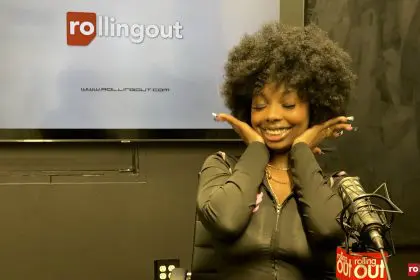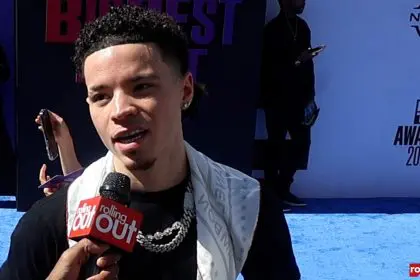
On a seasonably warm August night in Atlanta, a quiet storm was brewing inside Little Five Point’s Aisle 5. The redesigned concert venue is fairly small with an open floor, bar tables lining the walls, a small stage near the entrance and a bar parallel towards the back, all of it lending itself to an intimate performance experience. The audience’s anticipation grew with every tease from the light technicians and sound mixer. Then shortly after 10 p.m., Kamasi Washington and his band, the West Coast Get Down, walked onto the stage.
It was Washington’s first time in Atlanta, but the diverse crowd he drew was no different than any other city he has travelled thus far. People from all walks of life congregated to hear live interpretations of his debut studio album, The Epic. As the title suggests, the sprawling LP consisting of 17 songs broken into three volumes with many of the songs exceed the 10- minute mark. Such grandiose work requires a great amount of time to create, from its inception to the final stages of post production.
“It started in 2010, and Flying Lotus asked me if I want to make a record for Brainfeeder. And I was like, ‘Yeah, what kind of record do you want me to make?’ And he basically said, ‘Whatever you want to make.’ ”
This conversation reminded him of another conversation five years prior with late great jazz trumpeter and band leader Gerald Wilson. Sitting in his home, he and Washington played some records Kamasi was working on at the time and Wilson suggested adding orchestral elements to the song to make it grander. With Lotus’ blessings, Washington found the spark to begin recording.

The Epic is rooted in jazz, but it transcends the genre through its beautiful blend of various musical traditions ranging from deep soul, orchestral, hymnal, and West African grooves. “Music comes from a different place, it doesn’t come from a musician,” Washington says. “I try to quiet my mind and just let it come. Eventually something will come: a chord, a sound. I take that and I expand it. What it is kind of dictates what I can expand it into. But that’s where I come in, that’s where Kamasi comes in.”
This meditative process of music making flows throughout the album, from the more loosely structured songs like “Seven Prayers” which sounds like a musical interpretation of a preacher giving a eulogy, to “Leroy and Lanisha, an urbanized, swinging ode to Charlie Brown and the Peanuts Gang.
Prior to the album, Washington self-released one live album and two LPs under his own imprint, and he has made headway as a sideman on projects with Snoop Dogg, Flying Lotus, Thundercat and Kendrick Lamar. Kamasi played an intricate roll on Lamar’s critically acclaimed To Pimp a Butterfly, providing string arrangements and his tenor saxophone sound.
“Terrace Martin, who I knew since we were kids, brought me in with Kendrick. And he actually put me on Kendrick years ago, probably 2008, 2009. He was expressing how great this guy was,” Washington says. “Then like most people, I really got into good kid, m.A.A.d. city. So I knew they were working on this album for about two years, and I was curious to see what they were doing but I didn’t know …”
During this time, around late summer/fall 2014, Washington was working on Martin’s new album Velvet Portraits. During these sessions Washington would play Martin some cuts from The Epic. Impressed by what he heard, Martin asked him to create an arrangement for the final song on the album. “The album was about 80 percent done,” Washington recalls. “And they wanted me to write something for the skit at the end of ‘Mortal Man.’ ”
Martin and Lamar ended up playing the entire album for Washington several times, each time adding input on a sound he should add to a song. “By the end of it I [had] about four or five songs with my credits toward them,” he says.

Washington was blown away by Butterfly, impressed by how unified the album sounded with contributions from many of his closest musical friends. “I heard like the essence of Thundercat, the essence of Terrace [Martin], [Flying] Lotus and all of these people in the album…these guys had a lot of space to really infuse who they really are,” he says.
And it should come as no surprise that these gentlemen put out bodies of work within the same time period: Flying Lotus’ You’re Dead! (October 2014), Lamar in March of this year, Washington in May and Thundercat’s The Beyond / Where the Giants Roam in June.
“I think expressive music, music that’s made to express the experience and feelings and ideas of the musician, is coming back,” he explains. “Music can exist for different purposes, and I think people get hip to improvisational music because you want to express yourself. You’re different today than you are tomorrow. You improvise to capture the feeling of the moment that you’re in because that’s the most relevant feeling that you’ll have.”
Moving forward, Washington has many more songs from The Epic recording sessions that didn’t make the cut, plus several members of the West Coast Get Down have their solo projects in the works. He’ll have his hands tied for the next several months getting all of these projects realized while also being on his current world tour. He is hopeful that the new wave of expressive music will continue to expand in the public’s consciousness.
“I think society has always been open to expressive music, but I don’t know if they new what that meant. It’s like once you’ve experienced good organic food that’s all that you’re going to want. Once the seeds are planted into people’s minds, that’s all that they’ll want at the end of the day,” he says.
















